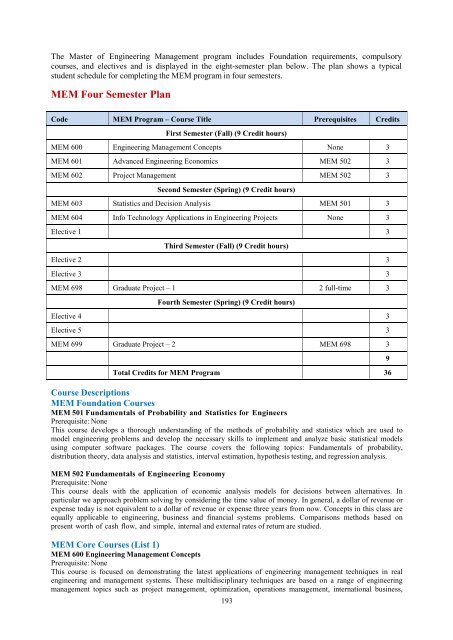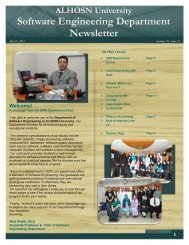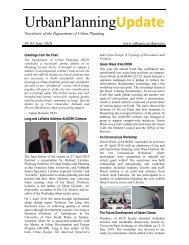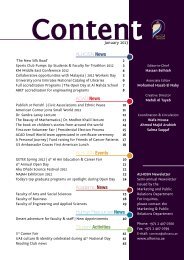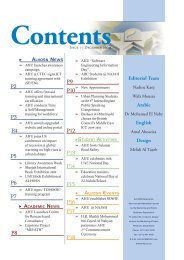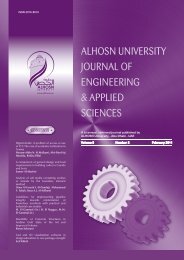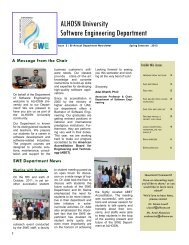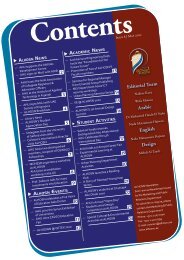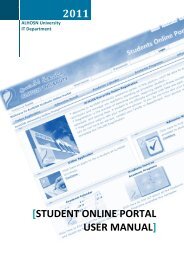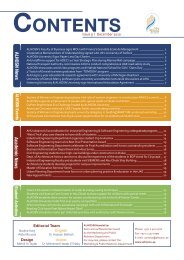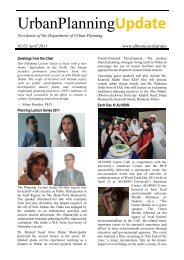ALHOSN University Catalogue Global Knowledge with Local Vision ...
ALHOSN University Catalogue Global Knowledge with Local Vision ...
ALHOSN University Catalogue Global Knowledge with Local Vision ...
You also want an ePaper? Increase the reach of your titles
YUMPU automatically turns print PDFs into web optimized ePapers that Google loves.
The Master of Engineering Management program includes Foundation requirements, compulsory<br />
courses, and electives and is displayed in the eight-semester plan below. The plan shows a typical<br />
student schedule for completing the MEM program in four semesters.<br />
MEM Four Semester Plan<br />
Code MEM Program – Course Title Prerequisites Credits<br />
First Semester (Fall) (9 Credit hours)<br />
MEM 600 Engineering Management Concepts None 3<br />
MEM 601 Advanced Engineering Economics MEM 502 3<br />
MEM 602 Project Management MEM 502 3<br />
Second Semester (Spring) (9 Credit hours)<br />
MEM 603 Statistics and Decision Analysis MEM 501 3<br />
MEM 604 Info Technology Applications in Engineering Projects None 3<br />
Elective 1 3<br />
Third Semester (Fall) (9 Credit hours)<br />
Elective 2 3<br />
Elective 3 3<br />
MEM 698 Graduate Project – 1 2 full-time<br />
Fourth Semester (Spring) (9 Credit hours)<br />
semesters<br />
Elective 4 3<br />
Elective 5 3<br />
MEM 699 Graduate Project – 2 MEM 698 3<br />
Total Credits for MEM Program 36<br />
Course Descriptions<br />
MEM Foundation Courses<br />
MEM 501 Fundamentals of Probability and Statistics for Engineers<br />
Prerequisite: None<br />
This course develops a thorough understanding of the methods of probability and statistics which are used to<br />
model engineering problems and develop the necessary skills to implement and analyze basic statistical models<br />
using computer software packages. The course covers the following topics: Fundamentals of probability,<br />
distribution theory, data analysis and statistics, interval estimation, hypothesis testing, and regression analysis.<br />
MEM 502 Fundamentals of Engineering Economy<br />
Prerequisite: None<br />
This course deals <strong>with</strong> the application of economic analysis models for decisions between alternatives. In<br />
particular we approach problem solving by considering the time value of money. In general, a dollar of revenue or<br />
expense today is not equivalent to a dollar of revenue or expense three years from now. Concepts in this class are<br />
equally applicable to engineering, business and financial systems problems. Comparisons methods based on<br />
present worth of cash flow, and simple, internal and external rates of return are studied.<br />
MEM Core Courses (List 1)<br />
MEM 600 Engineering Management Concepts<br />
Prerequisite: None<br />
This course is focused on demonstrating the latest applications of engineering management techniques in real<br />
engineering and management systems. These multidisciplinary techniques are based on a range of engineering<br />
management topics such as project management, optimization, operations management, international business,<br />
193<br />
3<br />
9


